Research Proposal: English Teaching and Communicative Ability
VerifiedAdded on 2023/04/21
|30
|9144
|340
Report
AI Summary
This research proposal examines teacher approaches in English language teaching and their effect on students' communicative abilities within a tertiary college setting, specifically at the International Maritime College Oman (IMCO). The study acknowledges the growing importance of English in Oman and the need for effective teaching strategies, considering the Omani educational system and the General Foundation Programme (GFP) at IMCO. The proposal outlines the research problem, which focuses on the GFP's English language curriculum, including its modules, assessments, and learning outcomes. It highlights the significance of the four English language skills (listening, speaking, reading, and writing) and how they are assessed. The research aims to analyze the relationship between teaching approaches and student performance, contributing to the improvement of English language instruction in tertiary education. The proposal also discusses the context of English language learning in Oman, including its role in primary and tertiary education, the textbooks used, and the challenges faced by students. The study will provide insights into effective strategies for enhancing students' communicative competence in English, addressing the demands of a globalized world and the needs of the Omani educational system.
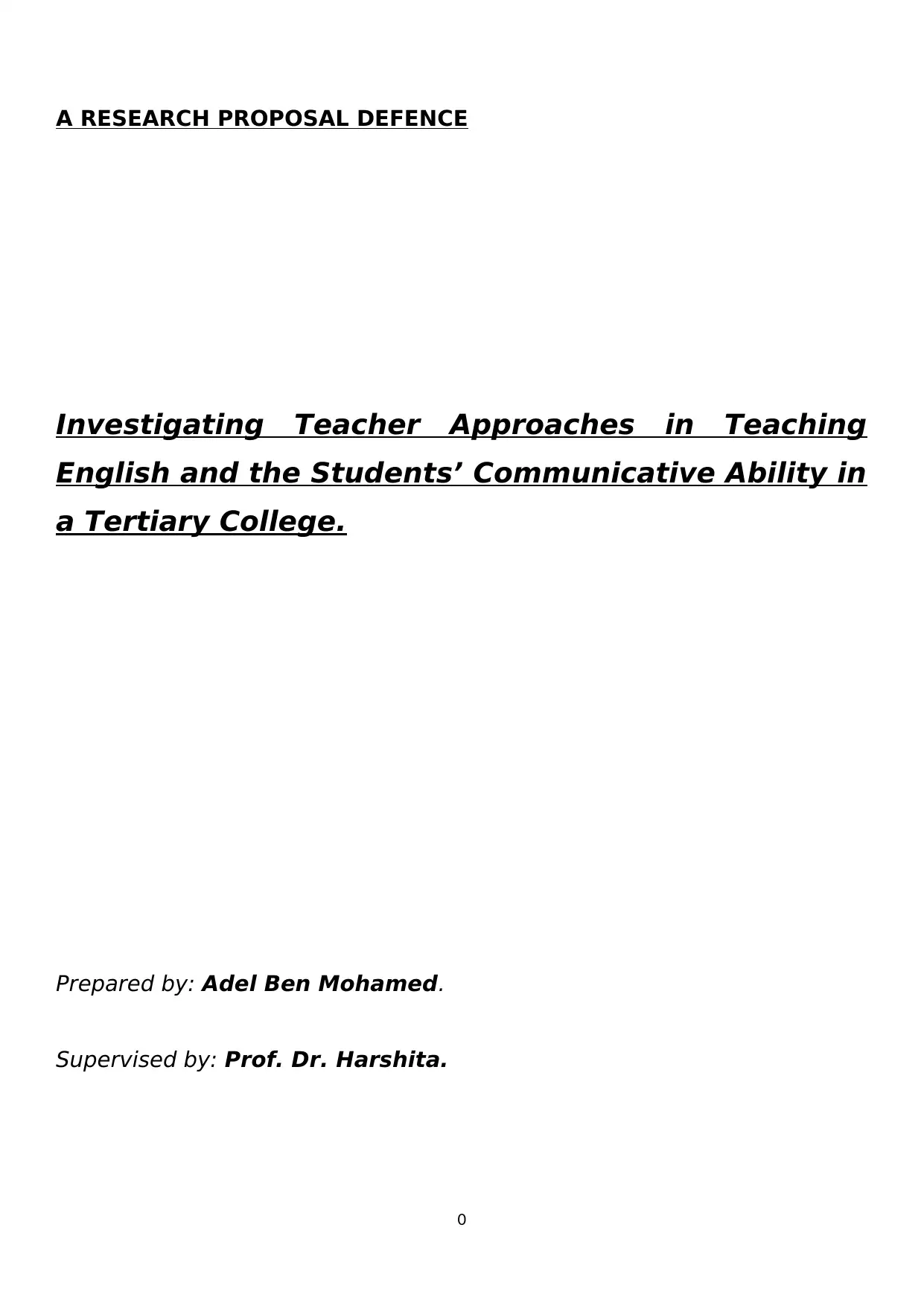
A RESEARCH PROPOSAL DEFENCE
Investigating Teacher Approaches in Teaching
English and the Students’ Communicative Ability in
a Tertiary College.
Prepared by: Adel Ben Mohamed.
Supervised by: Prof. Dr. Harshita.
0
Investigating Teacher Approaches in Teaching
English and the Students’ Communicative Ability in
a Tertiary College.
Prepared by: Adel Ben Mohamed.
Supervised by: Prof. Dr. Harshita.
0
Paraphrase This Document
Need a fresh take? Get an instant paraphrase of this document with our AI Paraphraser
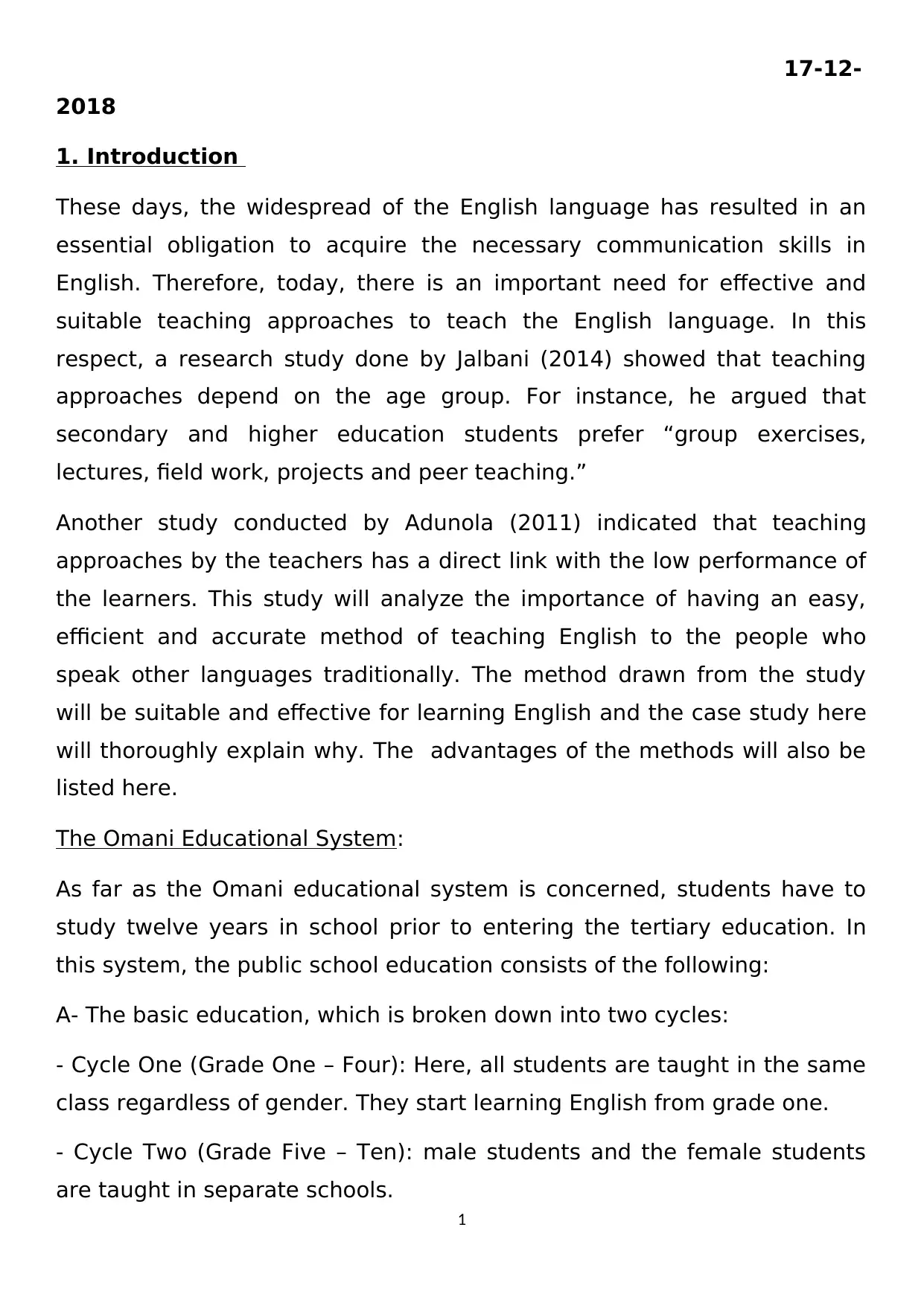
17-12-
2018
1. Introduction
These days, the widespread of the English language has resulted in an
essential obligation to acquire the necessary communication skills in
English. Therefore, today, there is an important need for effective and
suitable teaching approaches to teach the English language. In this
respect, a research study done by Jalbani (2014) showed that teaching
approaches depend on the age group. For instance, he argued that
secondary and higher education students prefer “group exercises,
lectures, field work, projects and peer teaching.”
Another study conducted by Adunola (2011) indicated that teaching
approaches by the teachers has a direct link with the low performance of
the learners. This study will analyze the importance of having an easy,
efficient and accurate method of teaching English to the people who
speak other languages traditionally. The method drawn from the study
will be suitable and effective for learning English and the case study here
will thoroughly explain why. The advantages of the methods will also be
listed here.
The Omani Educational System:
As far as the Omani educational system is concerned, students have to
study twelve years in school prior to entering the tertiary education. In
this system, the public school education consists of the following:
A- The basic education, which is broken down into two cycles:
- Cycle One (Grade One – Four): Here, all students are taught in the same
class regardless of gender. They start learning English from grade one.
- Cycle Two (Grade Five – Ten): male students and the female students
are taught in separate schools.
1
2018
1. Introduction
These days, the widespread of the English language has resulted in an
essential obligation to acquire the necessary communication skills in
English. Therefore, today, there is an important need for effective and
suitable teaching approaches to teach the English language. In this
respect, a research study done by Jalbani (2014) showed that teaching
approaches depend on the age group. For instance, he argued that
secondary and higher education students prefer “group exercises,
lectures, field work, projects and peer teaching.”
Another study conducted by Adunola (2011) indicated that teaching
approaches by the teachers has a direct link with the low performance of
the learners. This study will analyze the importance of having an easy,
efficient and accurate method of teaching English to the people who
speak other languages traditionally. The method drawn from the study
will be suitable and effective for learning English and the case study here
will thoroughly explain why. The advantages of the methods will also be
listed here.
The Omani Educational System:
As far as the Omani educational system is concerned, students have to
study twelve years in school prior to entering the tertiary education. In
this system, the public school education consists of the following:
A- The basic education, which is broken down into two cycles:
- Cycle One (Grade One – Four): Here, all students are taught in the same
class regardless of gender. They start learning English from grade one.
- Cycle Two (Grade Five – Ten): male students and the female students
are taught in separate schools.
1
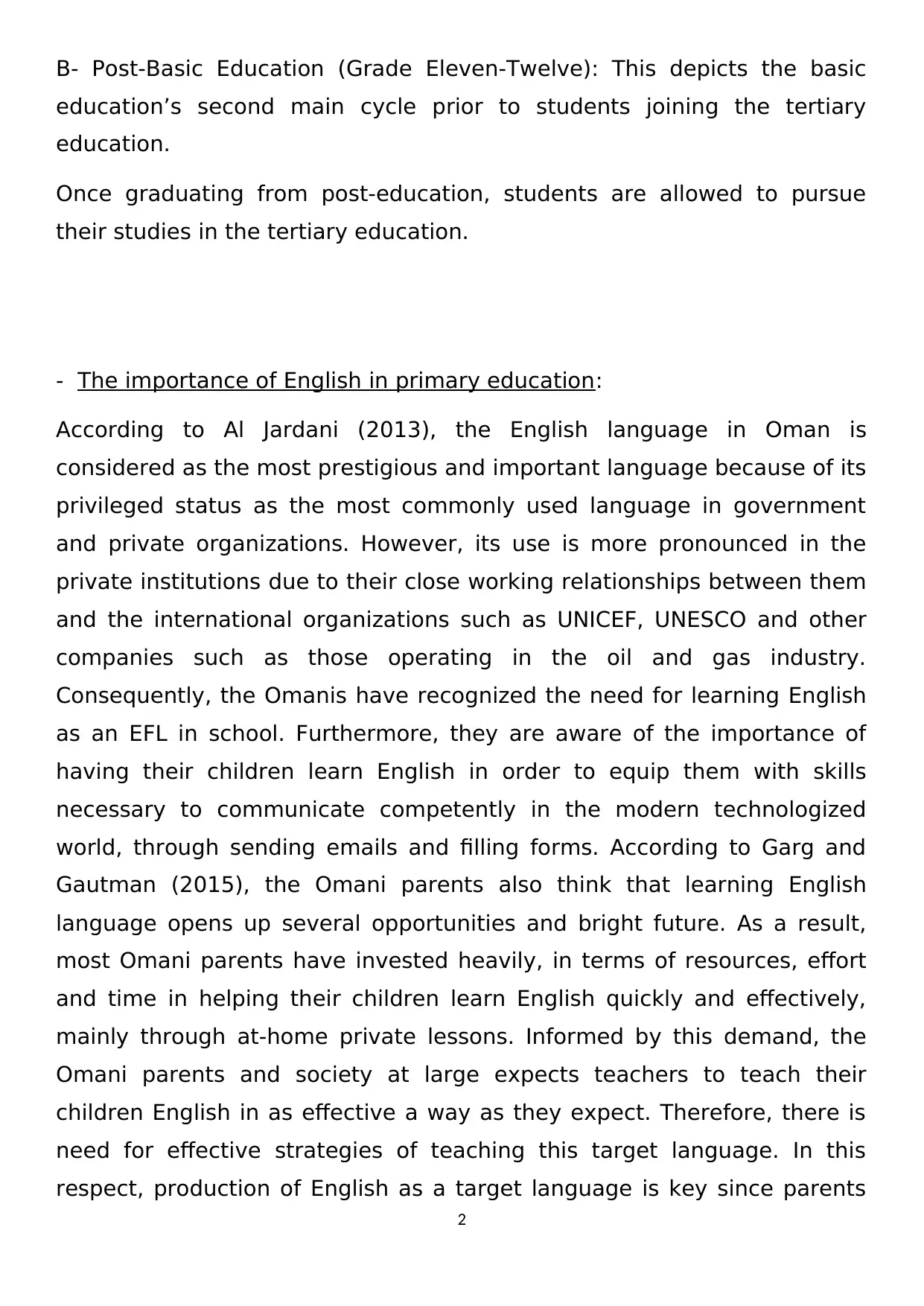
B- Post-Basic Education (Grade Eleven-Twelve): This depicts the basic
education’s second main cycle prior to students joining the tertiary
education.
Once graduating from post-education, students are allowed to pursue
their studies in the tertiary education.
- The importance of English in primary education:
According to Al Jardani (2013), the English language in Oman is
considered as the most prestigious and important language because of its
privileged status as the most commonly used language in government
and private organizations. However, its use is more pronounced in the
private institutions due to their close working relationships between them
and the international organizations such as UNICEF, UNESCO and other
companies such as those operating in the oil and gas industry.
Consequently, the Omanis have recognized the need for learning English
as an EFL in school. Furthermore, they are aware of the importance of
having their children learn English in order to equip them with skills
necessary to communicate competently in the modern technologized
world, through sending emails and filling forms. According to Garg and
Gautman (2015), the Omani parents also think that learning English
language opens up several opportunities and bright future. As a result,
most Omani parents have invested heavily, in terms of resources, effort
and time in helping their children learn English quickly and effectively,
mainly through at-home private lessons. Informed by this demand, the
Omani parents and society at large expects teachers to teach their
children English in as effective a way as they expect. Therefore, there is
need for effective strategies of teaching this target language. In this
respect, production of English as a target language is key since parents
2
education’s second main cycle prior to students joining the tertiary
education.
Once graduating from post-education, students are allowed to pursue
their studies in the tertiary education.
- The importance of English in primary education:
According to Al Jardani (2013), the English language in Oman is
considered as the most prestigious and important language because of its
privileged status as the most commonly used language in government
and private organizations. However, its use is more pronounced in the
private institutions due to their close working relationships between them
and the international organizations such as UNICEF, UNESCO and other
companies such as those operating in the oil and gas industry.
Consequently, the Omanis have recognized the need for learning English
as an EFL in school. Furthermore, they are aware of the importance of
having their children learn English in order to equip them with skills
necessary to communicate competently in the modern technologized
world, through sending emails and filling forms. According to Garg and
Gautman (2015), the Omani parents also think that learning English
language opens up several opportunities and bright future. As a result,
most Omani parents have invested heavily, in terms of resources, effort
and time in helping their children learn English quickly and effectively,
mainly through at-home private lessons. Informed by this demand, the
Omani parents and society at large expects teachers to teach their
children English in as effective a way as they expect. Therefore, there is
need for effective strategies of teaching this target language. In this
respect, production of English as a target language is key since parents
2
⊘ This is a preview!⊘
Do you want full access?
Subscribe today to unlock all pages.

Trusted by 1+ million students worldwide
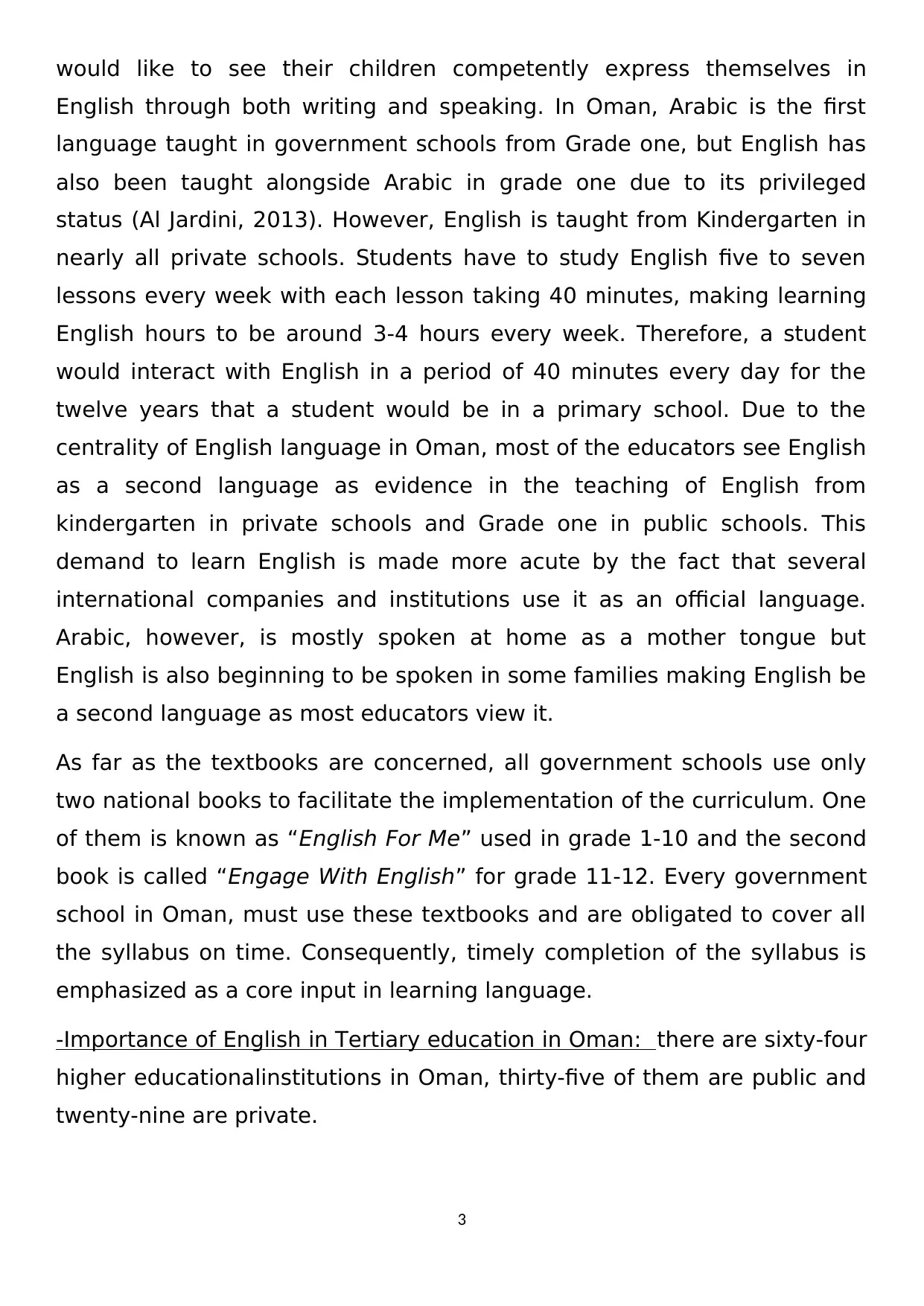
would like to see their children competently express themselves in
English through both writing and speaking. In Oman, Arabic is the first
language taught in government schools from Grade one, but English has
also been taught alongside Arabic in grade one due to its privileged
status (Al Jardini, 2013). However, English is taught from Kindergarten in
nearly all private schools. Students have to study English five to seven
lessons every week with each lesson taking 40 minutes, making learning
English hours to be around 3-4 hours every week. Therefore, a student
would interact with English in a period of 40 minutes every day for the
twelve years that a student would be in a primary school. Due to the
centrality of English language in Oman, most of the educators see English
as a second language as evidence in the teaching of English from
kindergarten in private schools and Grade one in public schools. This
demand to learn English is made more acute by the fact that several
international companies and institutions use it as an official language.
Arabic, however, is mostly spoken at home as a mother tongue but
English is also beginning to be spoken in some families making English be
a second language as most educators view it.
As far as the textbooks are concerned, all government schools use only
two national books to facilitate the implementation of the curriculum. One
of them is known as “English For Me” used in grade 1-10 and the second
book is called “Engage With English” for grade 11-12. Every government
school in Oman, must use these textbooks and are obligated to cover all
the syllabus on time. Consequently, timely completion of the syllabus is
emphasized as a core input in learning language.
-Importance of English in Tertiary education in Oman: there are sixty-four
higher educationalinstitutions in Oman, thirty-five of them are public and
twenty-nine are private.
3
English through both writing and speaking. In Oman, Arabic is the first
language taught in government schools from Grade one, but English has
also been taught alongside Arabic in grade one due to its privileged
status (Al Jardini, 2013). However, English is taught from Kindergarten in
nearly all private schools. Students have to study English five to seven
lessons every week with each lesson taking 40 minutes, making learning
English hours to be around 3-4 hours every week. Therefore, a student
would interact with English in a period of 40 minutes every day for the
twelve years that a student would be in a primary school. Due to the
centrality of English language in Oman, most of the educators see English
as a second language as evidence in the teaching of English from
kindergarten in private schools and Grade one in public schools. This
demand to learn English is made more acute by the fact that several
international companies and institutions use it as an official language.
Arabic, however, is mostly spoken at home as a mother tongue but
English is also beginning to be spoken in some families making English be
a second language as most educators view it.
As far as the textbooks are concerned, all government schools use only
two national books to facilitate the implementation of the curriculum. One
of them is known as “English For Me” used in grade 1-10 and the second
book is called “Engage With English” for grade 11-12. Every government
school in Oman, must use these textbooks and are obligated to cover all
the syllabus on time. Consequently, timely completion of the syllabus is
emphasized as a core input in learning language.
-Importance of English in Tertiary education in Oman: there are sixty-four
higher educationalinstitutions in Oman, thirty-five of them are public and
twenty-nine are private.
3
Paraphrase This Document
Need a fresh take? Get an instant paraphrase of this document with our AI Paraphraser
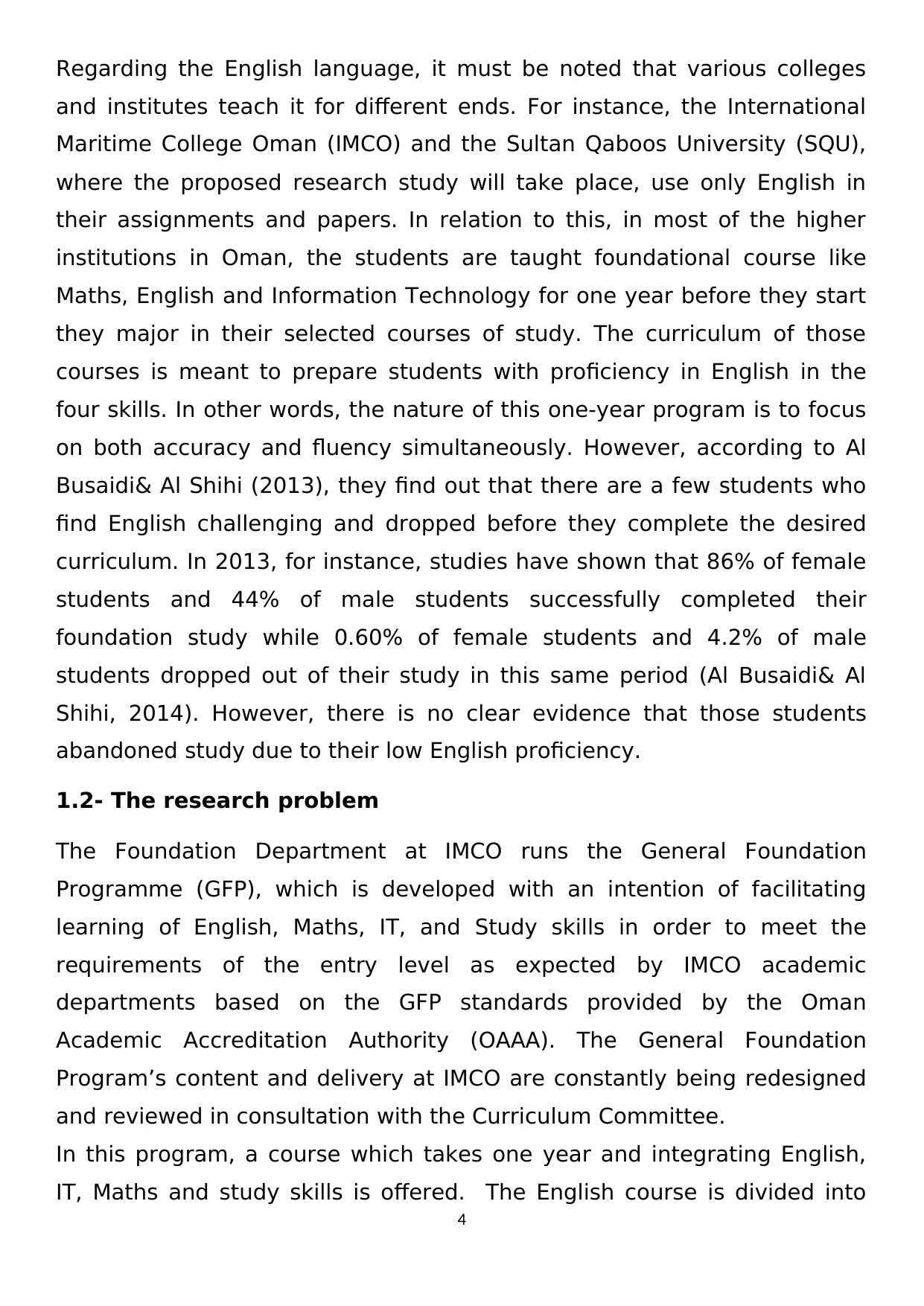
Regarding the English language, it must be noted that various colleges
and institutes teach it for different ends. For instance, the International
Maritime College Oman (IMCO) and the Sultan Qaboos University (SQU),
where the proposed research study will take place, use only English in
their assignments and papers. In relation to this, in most of the higher
institutions in Oman, the students are taught foundational course like
Maths, English and Information Technology for one year before they start
they major in their selected courses of study. The curriculum of those
courses is meant to prepare students with proficiency in English in the
four skills. In other words, the nature of this one-year program is to focus
on both accuracy and fluency simultaneously. However, according to Al
Busaidi& Al Shihi (2013), they find out that there are a few students who
find English challenging and dropped before they complete the desired
curriculum. In 2013, for instance, studies have shown that 86% of female
students and 44% of male students successfully completed their
foundation study while 0.60% of female students and 4.2% of male
students dropped out of their study in this same period (Al Busaidi& Al
Shihi, 2014). However, there is no clear evidence that those students
abandoned study due to their low English proficiency.
1.2- The research problem
The Foundation Department at IMCO runs the General Foundation
Programme (GFP), which is developed with an intention of facilitating
learning of English, Maths, IT, and Study skills in order to meet the
requirements of the entry level as expected by IMCO academic
departments based on the GFP standards provided by the Oman
Academic Accreditation Authority (OAAA). The General Foundation
Program’s content and delivery at IMCO are constantly being redesigned
and reviewed in consultation with the Curriculum Committee.
In this program, a course which takes one year and integrating English,
IT, Maths and study skills is offered. The English course is divided into
4
and institutes teach it for different ends. For instance, the International
Maritime College Oman (IMCO) and the Sultan Qaboos University (SQU),
where the proposed research study will take place, use only English in
their assignments and papers. In relation to this, in most of the higher
institutions in Oman, the students are taught foundational course like
Maths, English and Information Technology for one year before they start
they major in their selected courses of study. The curriculum of those
courses is meant to prepare students with proficiency in English in the
four skills. In other words, the nature of this one-year program is to focus
on both accuracy and fluency simultaneously. However, according to Al
Busaidi& Al Shihi (2013), they find out that there are a few students who
find English challenging and dropped before they complete the desired
curriculum. In 2013, for instance, studies have shown that 86% of female
students and 44% of male students successfully completed their
foundation study while 0.60% of female students and 4.2% of male
students dropped out of their study in this same period (Al Busaidi& Al
Shihi, 2014). However, there is no clear evidence that those students
abandoned study due to their low English proficiency.
1.2- The research problem
The Foundation Department at IMCO runs the General Foundation
Programme (GFP), which is developed with an intention of facilitating
learning of English, Maths, IT, and Study skills in order to meet the
requirements of the entry level as expected by IMCO academic
departments based on the GFP standards provided by the Oman
Academic Accreditation Authority (OAAA). The General Foundation
Program’s content and delivery at IMCO are constantly being redesigned
and reviewed in consultation with the Curriculum Committee.
In this program, a course which takes one year and integrating English,
IT, Maths and study skills is offered. The English course is divided into
4
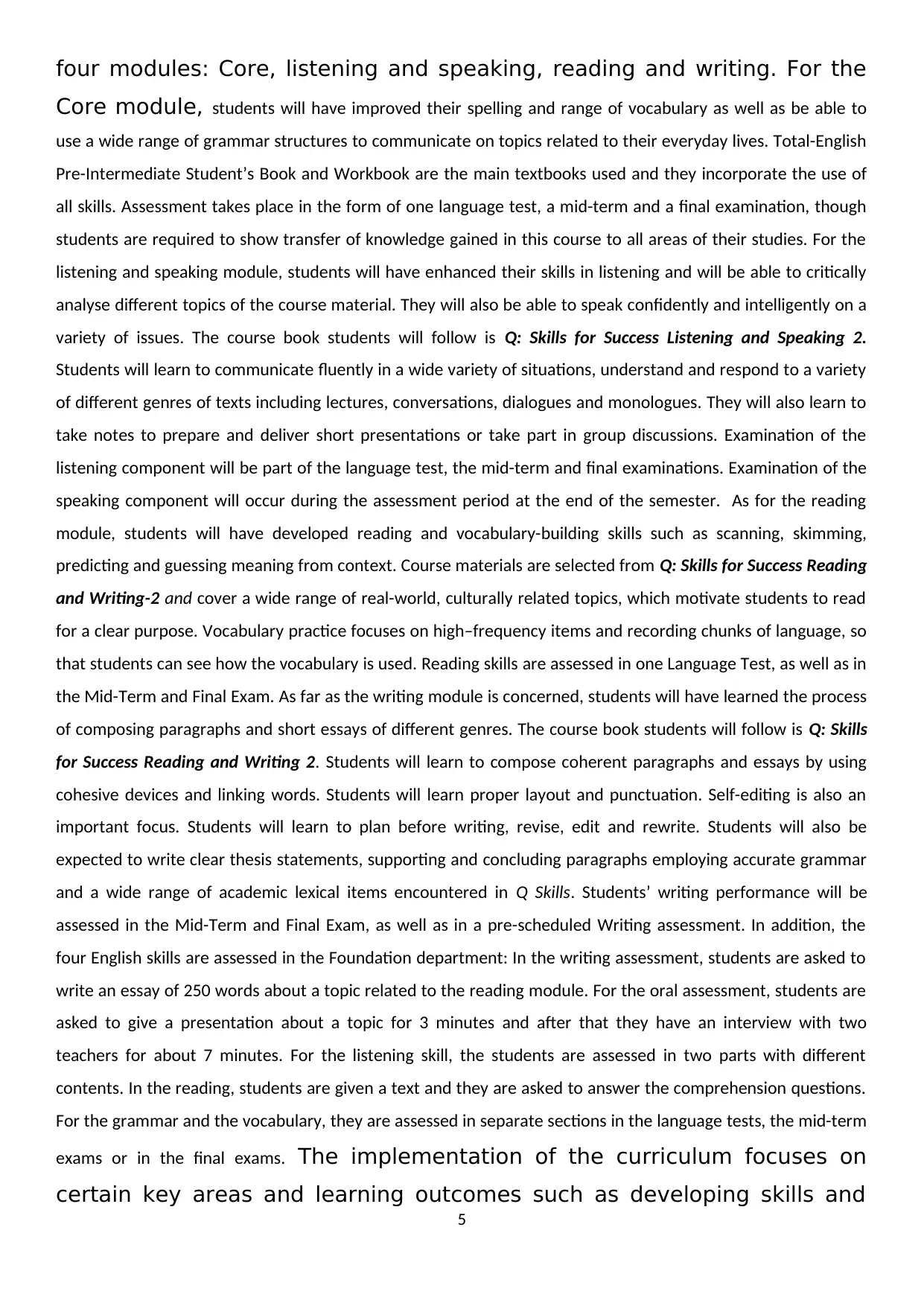
four modules: Core, listening and speaking, reading and writing. For the
Core module, students will have improved their spelling and range of vocabulary as well as be able to
use a wide range of grammar structures to communicate on topics related to their everyday lives. Total-English
Pre-Intermediate Student’s Book and Workbook are the main textbooks used and they incorporate the use of
all skills. Assessment takes place in the form of one language test, a mid-term and a final examination, though
students are required to show transfer of knowledge gained in this course to all areas of their studies. For the
listening and speaking module, students will have enhanced their skills in listening and will be able to critically
analyse different topics of the course material. They will also be able to speak confidently and intelligently on a
variety of issues. The course book students will follow is Q: Skills for Success Listening and Speaking 2.
Students will learn to communicate fluently in a wide variety of situations, understand and respond to a variety
of different genres of texts including lectures, conversations, dialogues and monologues. They will also learn to
take notes to prepare and deliver short presentations or take part in group discussions. Examination of the
listening component will be part of the language test, the mid-term and final examinations. Examination of the
speaking component will occur during the assessment period at the end of the semester. As for the reading
module, students will have developed reading and vocabulary-building skills such as scanning, skimming,
predicting and guessing meaning from context. Course materials are selected from Q: Skills for Success Reading
and Writing-2 and cover a wide range of real-world, culturally related topics, which motivate students to read
for a clear purpose. Vocabulary practice focuses on high–frequency items and recording chunks of language, so
that students can see how the vocabulary is used. Reading skills are assessed in one Language Test, as well as in
the Mid-Term and Final Exam. As far as the writing module is concerned, students will have learned the process
of composing paragraphs and short essays of different genres. The course book students will follow is Q: Skills
for Success Reading and Writing 2. Students will learn to compose coherent paragraphs and essays by using
cohesive devices and linking words. Students will learn proper layout and punctuation. Self-editing is also an
important focus. Students will learn to plan before writing, revise, edit and rewrite. Students will also be
expected to write clear thesis statements, supporting and concluding paragraphs employing accurate grammar
and a wide range of academic lexical items encountered in Q Skills. Students’ writing performance will be
assessed in the Mid-Term and Final Exam, as well as in a pre-scheduled Writing assessment. In addition, the
four English skills are assessed in the Foundation department: In the writing assessment, students are asked to
write an essay of 250 words about a topic related to the reading module. For the oral assessment, students are
asked to give a presentation about a topic for 3 minutes and after that they have an interview with two
teachers for about 7 minutes. For the listening skill, the students are assessed in two parts with different
contents. In the reading, students are given a text and they are asked to answer the comprehension questions.
For the grammar and the vocabulary, they are assessed in separate sections in the language tests, the mid-term
exams or in the final exams. The implementation of the curriculum focuses on
certain key areas and learning outcomes such as developing skills and
5
Core module, students will have improved their spelling and range of vocabulary as well as be able to
use a wide range of grammar structures to communicate on topics related to their everyday lives. Total-English
Pre-Intermediate Student’s Book and Workbook are the main textbooks used and they incorporate the use of
all skills. Assessment takes place in the form of one language test, a mid-term and a final examination, though
students are required to show transfer of knowledge gained in this course to all areas of their studies. For the
listening and speaking module, students will have enhanced their skills in listening and will be able to critically
analyse different topics of the course material. They will also be able to speak confidently and intelligently on a
variety of issues. The course book students will follow is Q: Skills for Success Listening and Speaking 2.
Students will learn to communicate fluently in a wide variety of situations, understand and respond to a variety
of different genres of texts including lectures, conversations, dialogues and monologues. They will also learn to
take notes to prepare and deliver short presentations or take part in group discussions. Examination of the
listening component will be part of the language test, the mid-term and final examinations. Examination of the
speaking component will occur during the assessment period at the end of the semester. As for the reading
module, students will have developed reading and vocabulary-building skills such as scanning, skimming,
predicting and guessing meaning from context. Course materials are selected from Q: Skills for Success Reading
and Writing-2 and cover a wide range of real-world, culturally related topics, which motivate students to read
for a clear purpose. Vocabulary practice focuses on high–frequency items and recording chunks of language, so
that students can see how the vocabulary is used. Reading skills are assessed in one Language Test, as well as in
the Mid-Term and Final Exam. As far as the writing module is concerned, students will have learned the process
of composing paragraphs and short essays of different genres. The course book students will follow is Q: Skills
for Success Reading and Writing 2. Students will learn to compose coherent paragraphs and essays by using
cohesive devices and linking words. Students will learn proper layout and punctuation. Self-editing is also an
important focus. Students will learn to plan before writing, revise, edit and rewrite. Students will also be
expected to write clear thesis statements, supporting and concluding paragraphs employing accurate grammar
and a wide range of academic lexical items encountered in Q Skills. Students’ writing performance will be
assessed in the Mid-Term and Final Exam, as well as in a pre-scheduled Writing assessment. In addition, the
four English skills are assessed in the Foundation department: In the writing assessment, students are asked to
write an essay of 250 words about a topic related to the reading module. For the oral assessment, students are
asked to give a presentation about a topic for 3 minutes and after that they have an interview with two
teachers for about 7 minutes. For the listening skill, the students are assessed in two parts with different
contents. In the reading, students are given a text and they are asked to answer the comprehension questions.
For the grammar and the vocabulary, they are assessed in separate sections in the language tests, the mid-term
exams or in the final exams. The implementation of the curriculum focuses on
certain key areas and learning outcomes such as developing skills and
5
⊘ This is a preview!⊘
Do you want full access?
Subscribe today to unlock all pages.

Trusted by 1+ million students worldwide
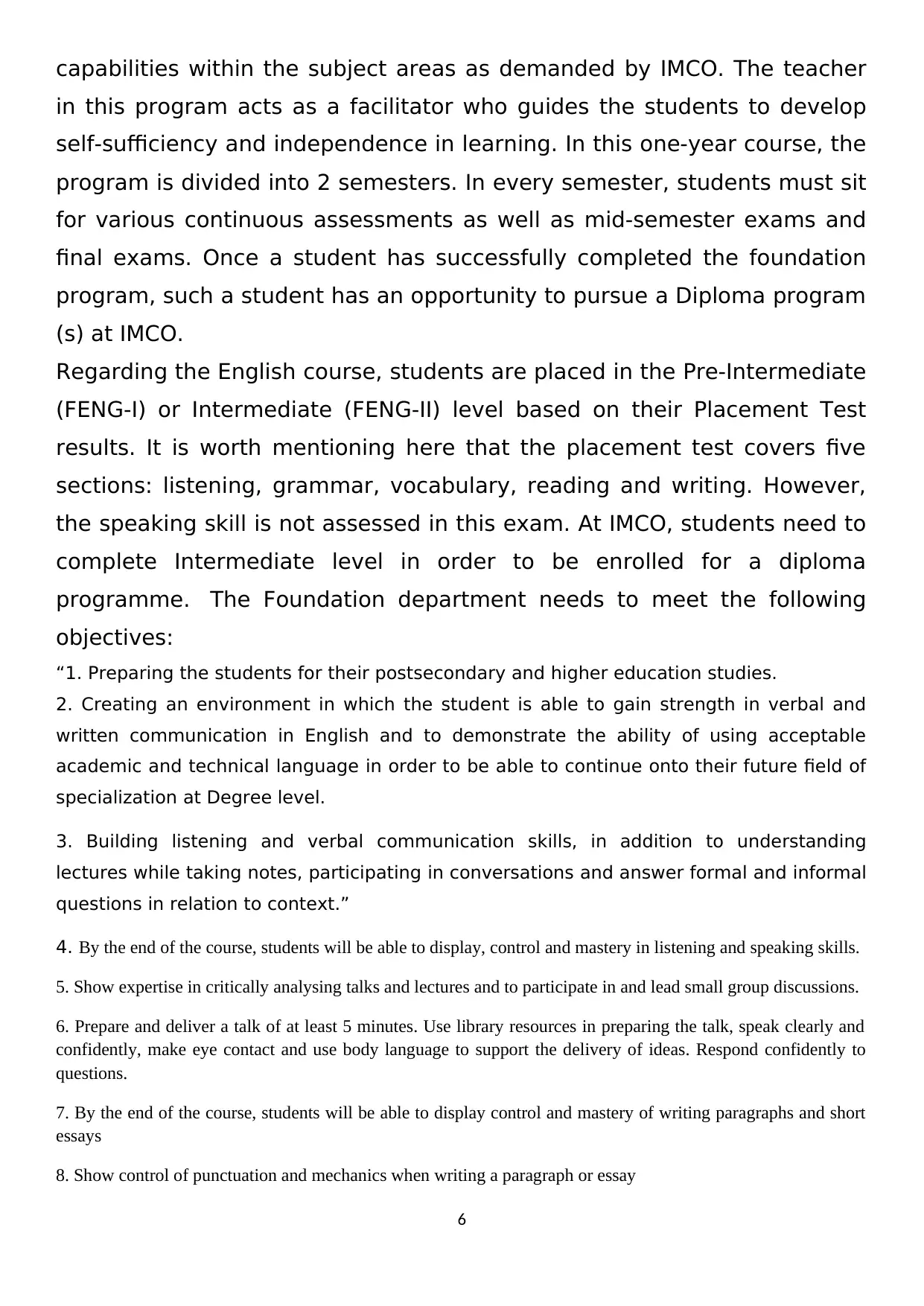
capabilities within the subject areas as demanded by IMCO. The teacher
in this program acts as a facilitator who guides the students to develop
self-sufficiency and independence in learning. In this one-year course, the
program is divided into 2 semesters. In every semester, students must sit
for various continuous assessments as well as mid-semester exams and
final exams. Once a student has successfully completed the foundation
program, such a student has an opportunity to pursue a Diploma program
(s) at IMCO.
Regarding the English course, students are placed in the Pre-Intermediate
(FENG-I) or Intermediate (FENG-II) level based on their Placement Test
results. It is worth mentioning here that the placement test covers five
sections: listening, grammar, vocabulary, reading and writing. However,
the speaking skill is not assessed in this exam. At IMCO, students need to
complete Intermediate level in order to be enrolled for a diploma
programme. The Foundation department needs to meet the following
objectives:
“1. Preparing the students for their postsecondary and higher education studies.
2. Creating an environment in which the student is able to gain strength in verbal and
written communication in English and to demonstrate the ability of using acceptable
academic and technical language in order to be able to continue onto their future field of
specialization at Degree level.
3. Building listening and verbal communication skills, in addition to understanding
lectures while taking notes, participating in conversations and answer formal and informal
questions in relation to context.”
4. By the end of the course, students will be able to display, control and mastery in listening and speaking skills.
5. Show expertise in critically analysing talks and lectures and to participate in and lead small group discussions.
6. Prepare and deliver a talk of at least 5 minutes. Use library resources in preparing the talk, speak clearly and
confidently, make eye contact and use body language to support the delivery of ideas. Respond confidently to
questions.
7. By the end of the course, students will be able to display control and mastery of writing paragraphs and short
essays
8. Show control of punctuation and mechanics when writing a paragraph or essay
6
in this program acts as a facilitator who guides the students to develop
self-sufficiency and independence in learning. In this one-year course, the
program is divided into 2 semesters. In every semester, students must sit
for various continuous assessments as well as mid-semester exams and
final exams. Once a student has successfully completed the foundation
program, such a student has an opportunity to pursue a Diploma program
(s) at IMCO.
Regarding the English course, students are placed in the Pre-Intermediate
(FENG-I) or Intermediate (FENG-II) level based on their Placement Test
results. It is worth mentioning here that the placement test covers five
sections: listening, grammar, vocabulary, reading and writing. However,
the speaking skill is not assessed in this exam. At IMCO, students need to
complete Intermediate level in order to be enrolled for a diploma
programme. The Foundation department needs to meet the following
objectives:
“1. Preparing the students for their postsecondary and higher education studies.
2. Creating an environment in which the student is able to gain strength in verbal and
written communication in English and to demonstrate the ability of using acceptable
academic and technical language in order to be able to continue onto their future field of
specialization at Degree level.
3. Building listening and verbal communication skills, in addition to understanding
lectures while taking notes, participating in conversations and answer formal and informal
questions in relation to context.”
4. By the end of the course, students will be able to display, control and mastery in listening and speaking skills.
5. Show expertise in critically analysing talks and lectures and to participate in and lead small group discussions.
6. Prepare and deliver a talk of at least 5 minutes. Use library resources in preparing the talk, speak clearly and
confidently, make eye contact and use body language to support the delivery of ideas. Respond confidently to
questions.
7. By the end of the course, students will be able to display control and mastery of writing paragraphs and short
essays
8. Show control of punctuation and mechanics when writing a paragraph or essay
6
Paraphrase This Document
Need a fresh take? Get an instant paraphrase of this document with our AI Paraphraser
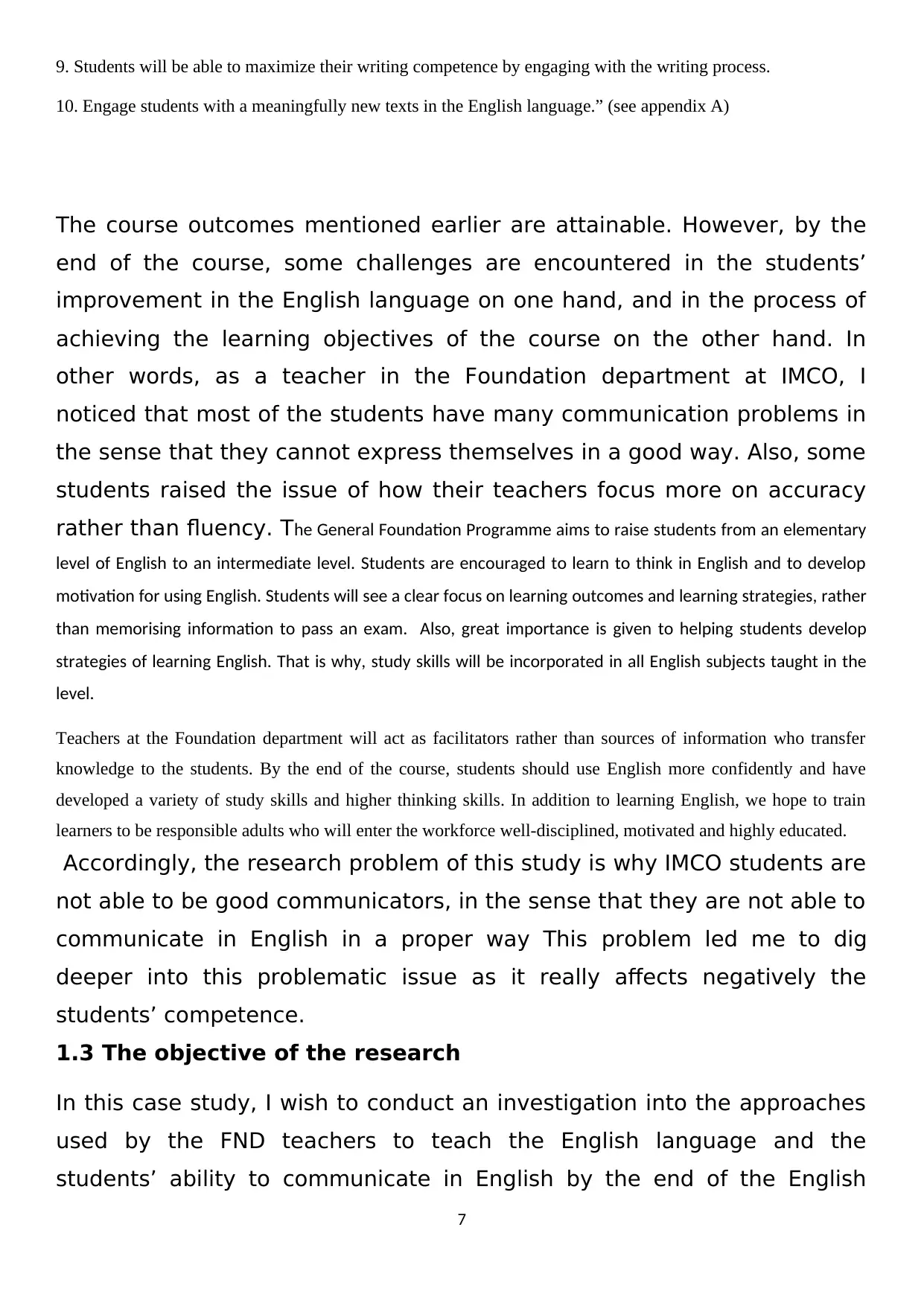
9. Students will be able to maximize their writing competence by engaging with the writing process.
10. Engage students with a meaningfully new texts in the English language.” (see appendix A)
The course outcomes mentioned earlier are attainable. However, by the
end of the course, some challenges are encountered in the students’
improvement in the English language on one hand, and in the process of
achieving the learning objectives of the course on the other hand. In
other words, as a teacher in the Foundation department at IMCO, I
noticed that most of the students have many communication problems in
the sense that they cannot express themselves in a good way. Also, some
students raised the issue of how their teachers focus more on accuracy
rather than fluency. The General Foundation Programme aims to raise students from an elementary
level of English to an intermediate level. Students are encouraged to learn to think in English and to develop
motivation for using English. Students will see a clear focus on learning outcomes and learning strategies, rather
than memorising information to pass an exam. Also, great importance is given to helping students develop
strategies of learning English. That is why, study skills will be incorporated in all English subjects taught in the
level.
Teachers at the Foundation department will act as facilitators rather than sources of information who transfer
knowledge to the students. By the end of the course, students should use English more confidently and have
developed a variety of study skills and higher thinking skills. In addition to learning English, we hope to train
learners to be responsible adults who will enter the workforce well-disciplined, motivated and highly educated.
Accordingly, the research problem of this study is why IMCO students are
not able to be good communicators, in the sense that they are not able to
communicate in English in a proper way This problem led me to dig
deeper into this problematic issue as it really affects negatively the
students’ competence.
1.3 The objective of the research
In this case study, I wish to conduct an investigation into the approaches
used by the FND teachers to teach the English language and the
students’ ability to communicate in English by the end of the English
7
10. Engage students with a meaningfully new texts in the English language.” (see appendix A)
The course outcomes mentioned earlier are attainable. However, by the
end of the course, some challenges are encountered in the students’
improvement in the English language on one hand, and in the process of
achieving the learning objectives of the course on the other hand. In
other words, as a teacher in the Foundation department at IMCO, I
noticed that most of the students have many communication problems in
the sense that they cannot express themselves in a good way. Also, some
students raised the issue of how their teachers focus more on accuracy
rather than fluency. The General Foundation Programme aims to raise students from an elementary
level of English to an intermediate level. Students are encouraged to learn to think in English and to develop
motivation for using English. Students will see a clear focus on learning outcomes and learning strategies, rather
than memorising information to pass an exam. Also, great importance is given to helping students develop
strategies of learning English. That is why, study skills will be incorporated in all English subjects taught in the
level.
Teachers at the Foundation department will act as facilitators rather than sources of information who transfer
knowledge to the students. By the end of the course, students should use English more confidently and have
developed a variety of study skills and higher thinking skills. In addition to learning English, we hope to train
learners to be responsible adults who will enter the workforce well-disciplined, motivated and highly educated.
Accordingly, the research problem of this study is why IMCO students are
not able to be good communicators, in the sense that they are not able to
communicate in English in a proper way This problem led me to dig
deeper into this problematic issue as it really affects negatively the
students’ competence.
1.3 The objective of the research
In this case study, I wish to conduct an investigation into the approaches
used by the FND teachers to teach the English language and the
students’ ability to communicate in English by the end of the English
7
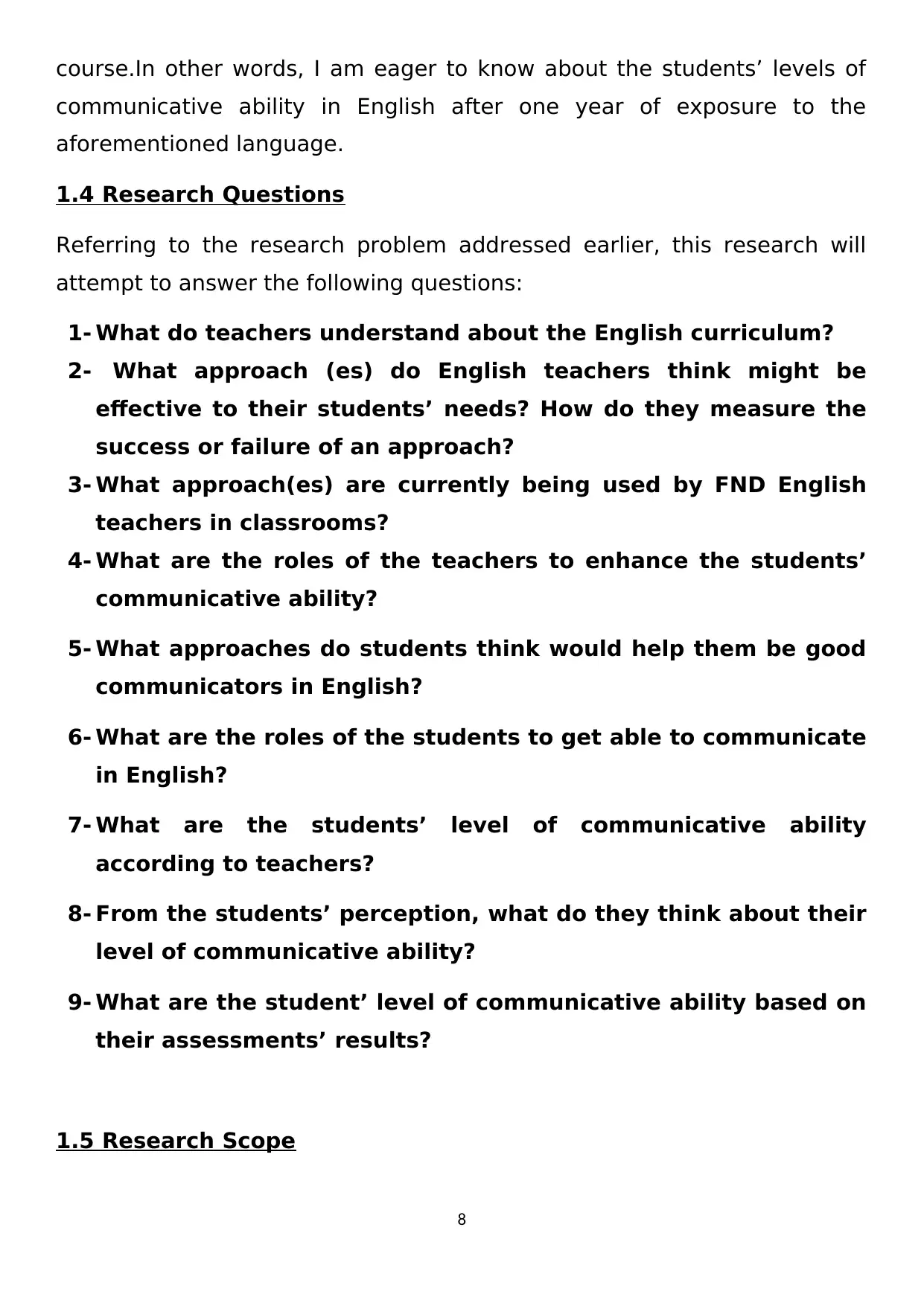
course.In other words, I am eager to know about the students’ levels of
communicative ability in English after one year of exposure to the
aforementioned language.
1.4 Research Questions
Referring to the research problem addressed earlier, this research will
attempt to answer the following questions:
1- What do teachers understand about the English curriculum?
2- What approach (es) do English teachers think might be
effective to their students’ needs? How do they measure the
success or failure of an approach?
3- What approach(es) are currently being used by FND English
teachers in classrooms?
4- What are the roles of the teachers to enhance the students’
communicative ability?
5- What approaches do students think would help them be good
communicators in English?
6- What are the roles of the students to get able to communicate
in English?
7- What are the students’ level of communicative ability
according to teachers?
8- From the students’ perception, what do they think about their
level of communicative ability?
9- What are the student’ level of communicative ability based on
their assessments’ results?
1.5 Research Scope
8
communicative ability in English after one year of exposure to the
aforementioned language.
1.4 Research Questions
Referring to the research problem addressed earlier, this research will
attempt to answer the following questions:
1- What do teachers understand about the English curriculum?
2- What approach (es) do English teachers think might be
effective to their students’ needs? How do they measure the
success or failure of an approach?
3- What approach(es) are currently being used by FND English
teachers in classrooms?
4- What are the roles of the teachers to enhance the students’
communicative ability?
5- What approaches do students think would help them be good
communicators in English?
6- What are the roles of the students to get able to communicate
in English?
7- What are the students’ level of communicative ability
according to teachers?
8- From the students’ perception, what do they think about their
level of communicative ability?
9- What are the student’ level of communicative ability based on
their assessments’ results?
1.5 Research Scope
8
⊘ This is a preview!⊘
Do you want full access?
Subscribe today to unlock all pages.

Trusted by 1+ million students worldwide
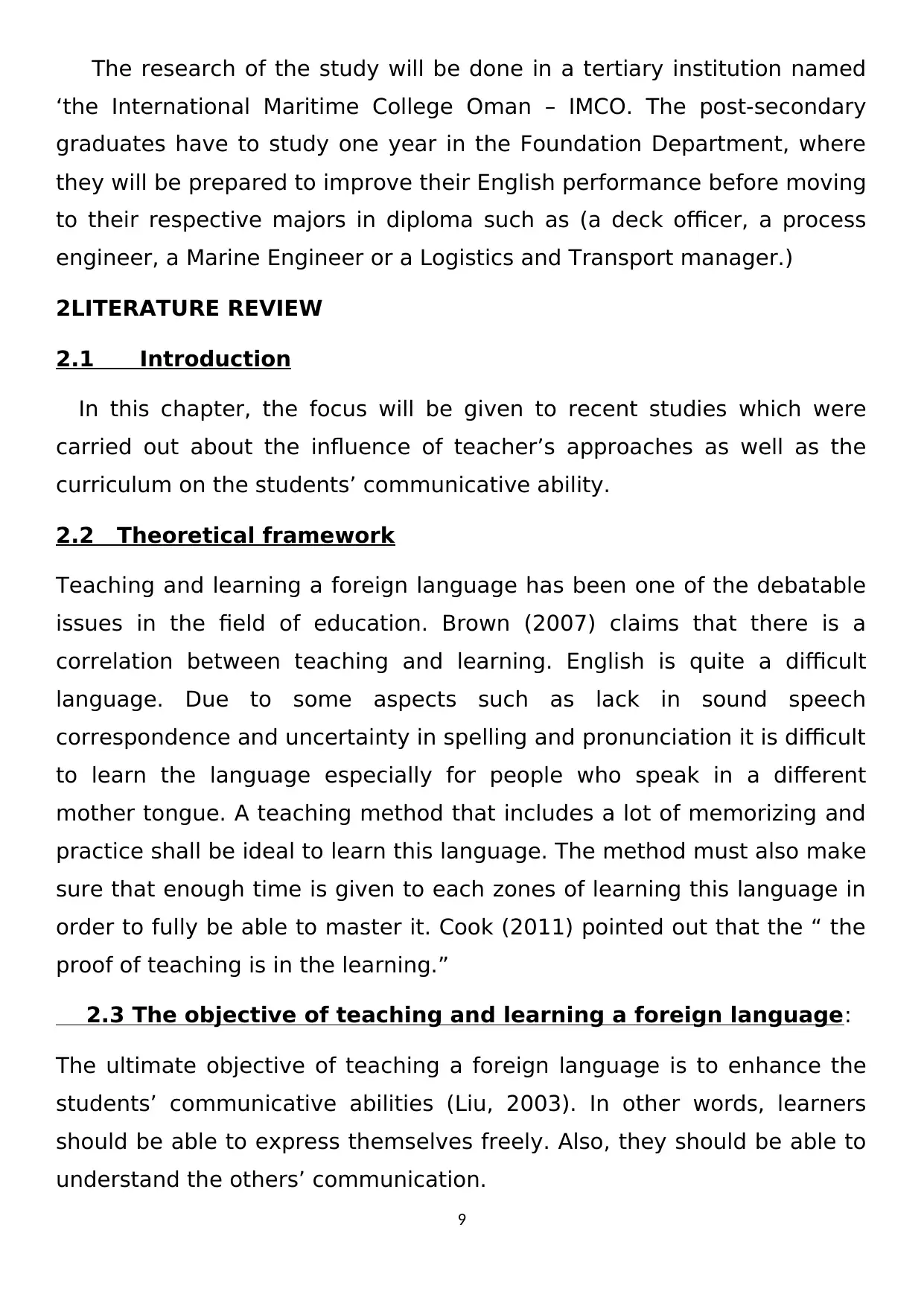
The research of the study will be done in a tertiary institution named
‘the International Maritime College Oman – IMCO. The post-secondary
graduates have to study one year in the Foundation Department, where
they will be prepared to improve their English performance before moving
to their respective majors in diploma such as (a deck officer, a process
engineer, a Marine Engineer or a Logistics and Transport manager.)
2LITERATURE REVIEW
2.1 Introduction
In this chapter, the focus will be given to recent studies which were
carried out about the influence of teacher’s approaches as well as the
curriculum on the students’ communicative ability.
2.2 Theoretical framework
Teaching and learning a foreign language has been one of the debatable
issues in the field of education. Brown (2007) claims that there is a
correlation between teaching and learning. English is quite a difficult
language. Due to some aspects such as lack in sound speech
correspondence and uncertainty in spelling and pronunciation it is difficult
to learn the language especially for people who speak in a different
mother tongue. A teaching method that includes a lot of memorizing and
practice shall be ideal to learn this language. The method must also make
sure that enough time is given to each zones of learning this language in
order to fully be able to master it. Cook (2011) pointed out that the “ the
proof of teaching is in the learning.”
2.3 The objective of teaching and learning a foreign language:
The ultimate objective of teaching a foreign language is to enhance the
students’ communicative abilities (Liu, 2003). In other words, learners
should be able to express themselves freely. Also, they should be able to
understand the others’ communication.
9
‘the International Maritime College Oman – IMCO. The post-secondary
graduates have to study one year in the Foundation Department, where
they will be prepared to improve their English performance before moving
to their respective majors in diploma such as (a deck officer, a process
engineer, a Marine Engineer or a Logistics and Transport manager.)
2LITERATURE REVIEW
2.1 Introduction
In this chapter, the focus will be given to recent studies which were
carried out about the influence of teacher’s approaches as well as the
curriculum on the students’ communicative ability.
2.2 Theoretical framework
Teaching and learning a foreign language has been one of the debatable
issues in the field of education. Brown (2007) claims that there is a
correlation between teaching and learning. English is quite a difficult
language. Due to some aspects such as lack in sound speech
correspondence and uncertainty in spelling and pronunciation it is difficult
to learn the language especially for people who speak in a different
mother tongue. A teaching method that includes a lot of memorizing and
practice shall be ideal to learn this language. The method must also make
sure that enough time is given to each zones of learning this language in
order to fully be able to master it. Cook (2011) pointed out that the “ the
proof of teaching is in the learning.”
2.3 The objective of teaching and learning a foreign language:
The ultimate objective of teaching a foreign language is to enhance the
students’ communicative abilities (Liu, 2003). In other words, learners
should be able to express themselves freely. Also, they should be able to
understand the others’ communication.
9
Paraphrase This Document
Need a fresh take? Get an instant paraphrase of this document with our AI Paraphraser
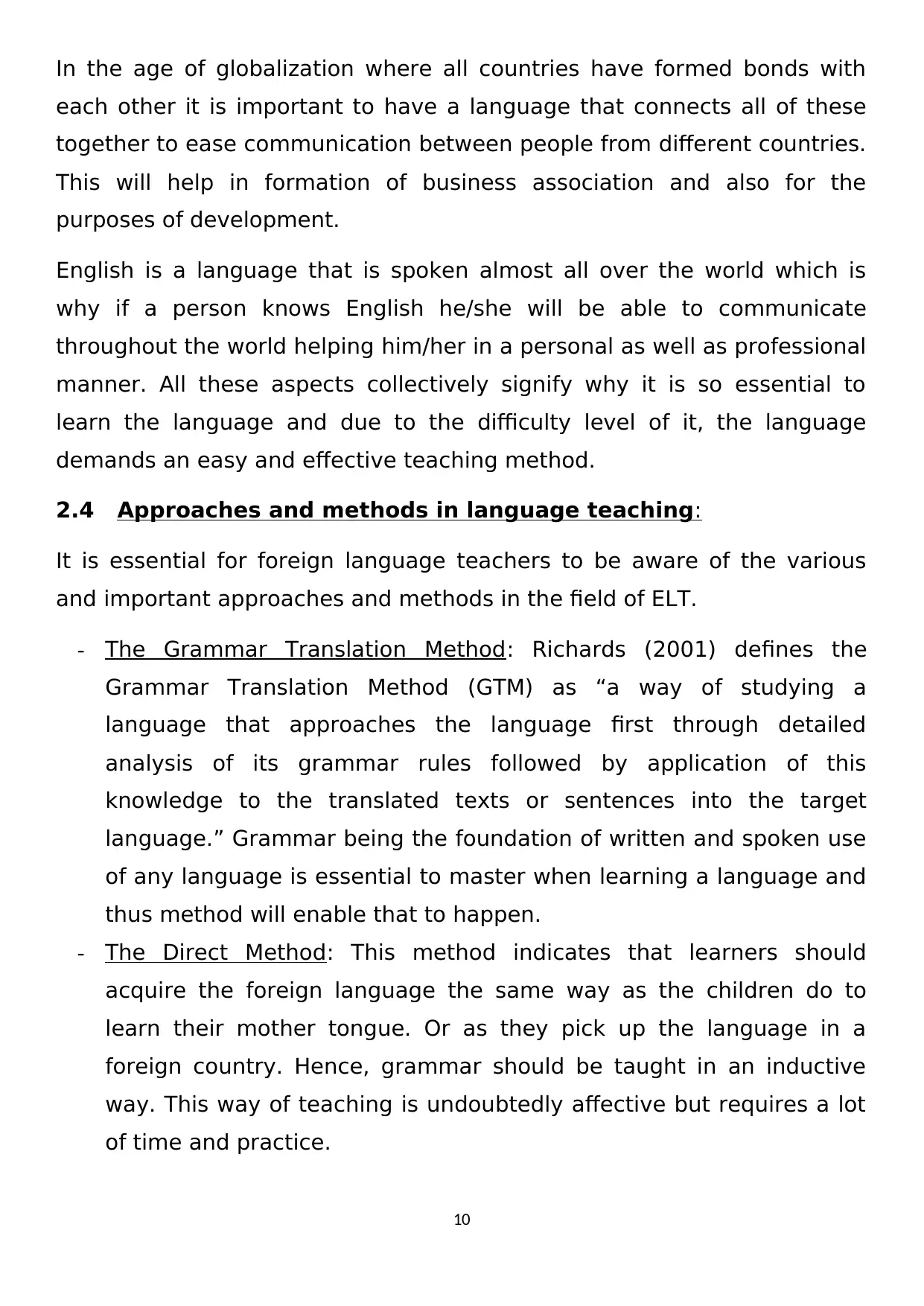
In the age of globalization where all countries have formed bonds with
each other it is important to have a language that connects all of these
together to ease communication between people from different countries.
This will help in formation of business association and also for the
purposes of development.
English is a language that is spoken almost all over the world which is
why if a person knows English he/she will be able to communicate
throughout the world helping him/her in a personal as well as professional
manner. All these aspects collectively signify why it is so essential to
learn the language and due to the difficulty level of it, the language
demands an easy and effective teaching method.
2.4 Approaches and methods in language teaching:
It is essential for foreign language teachers to be aware of the various
and important approaches and methods in the field of ELT.
- The Grammar Translation Method: Richards (2001) defines the
Grammar Translation Method (GTM) as “a way of studying a
language that approaches the language first through detailed
analysis of its grammar rules followed by application of this
knowledge to the translated texts or sentences into the target
language.” Grammar being the foundation of written and spoken use
of any language is essential to master when learning a language and
thus method will enable that to happen.
- The Direct Method: This method indicates that learners should
acquire the foreign language the same way as the children do to
learn their mother tongue. Or as they pick up the language in a
foreign country. Hence, grammar should be taught in an inductive
way. This way of teaching is undoubtedly affective but requires a lot
of time and practice.
10
each other it is important to have a language that connects all of these
together to ease communication between people from different countries.
This will help in formation of business association and also for the
purposes of development.
English is a language that is spoken almost all over the world which is
why if a person knows English he/she will be able to communicate
throughout the world helping him/her in a personal as well as professional
manner. All these aspects collectively signify why it is so essential to
learn the language and due to the difficulty level of it, the language
demands an easy and effective teaching method.
2.4 Approaches and methods in language teaching:
It is essential for foreign language teachers to be aware of the various
and important approaches and methods in the field of ELT.
- The Grammar Translation Method: Richards (2001) defines the
Grammar Translation Method (GTM) as “a way of studying a
language that approaches the language first through detailed
analysis of its grammar rules followed by application of this
knowledge to the translated texts or sentences into the target
language.” Grammar being the foundation of written and spoken use
of any language is essential to master when learning a language and
thus method will enable that to happen.
- The Direct Method: This method indicates that learners should
acquire the foreign language the same way as the children do to
learn their mother tongue. Or as they pick up the language in a
foreign country. Hence, grammar should be taught in an inductive
way. This way of teaching is undoubtedly affective but requires a lot
of time and practice.
10
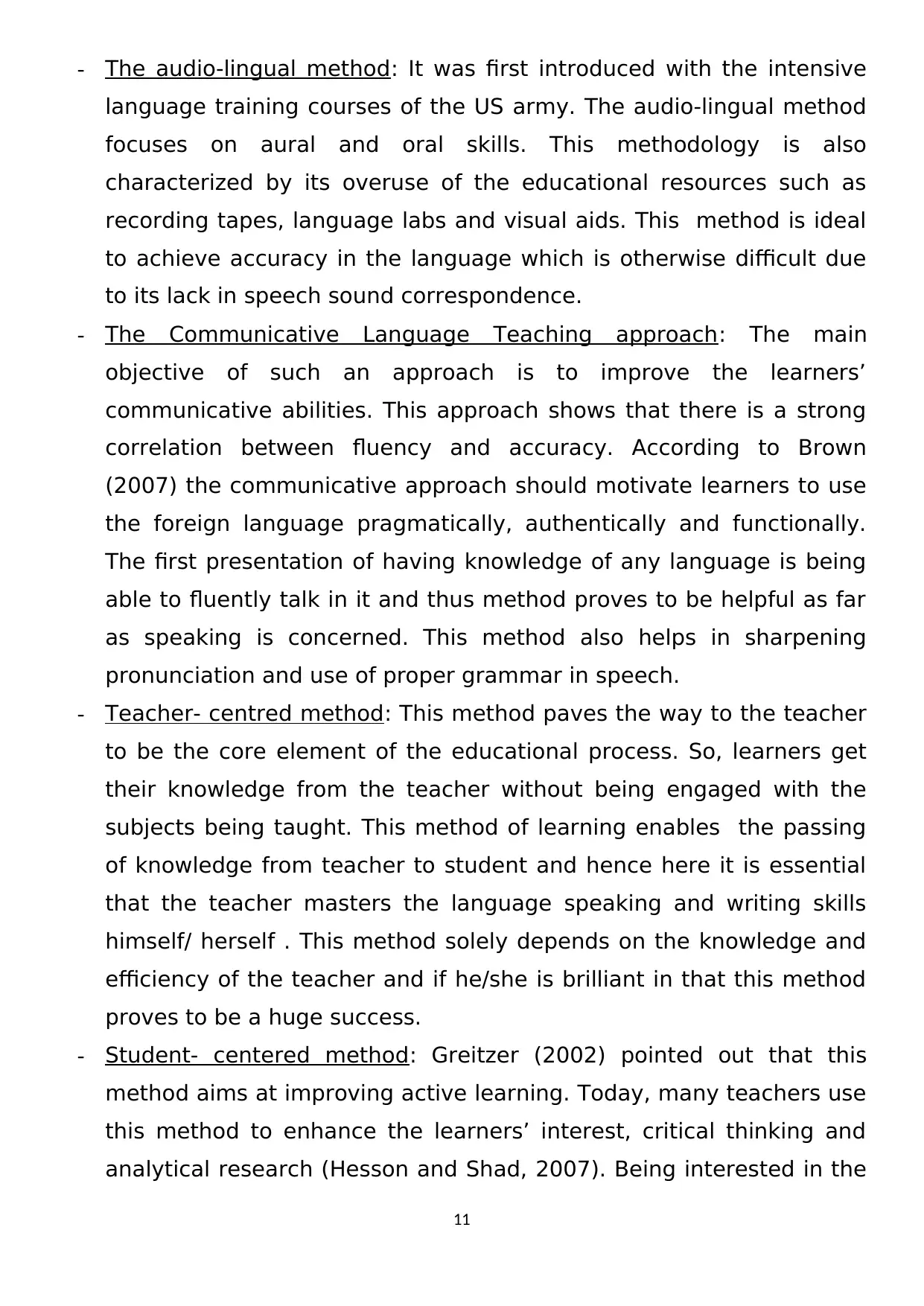
- The audio-lingual method: It was first introduced with the intensive
language training courses of the US army. The audio-lingual method
focuses on aural and oral skills. This methodology is also
characterized by its overuse of the educational resources such as
recording tapes, language labs and visual aids. This method is ideal
to achieve accuracy in the language which is otherwise difficult due
to its lack in speech sound correspondence.
- The Communicative Language Teaching approach: The main
objective of such an approach is to improve the learners’
communicative abilities. This approach shows that there is a strong
correlation between fluency and accuracy. According to Brown
(2007) the communicative approach should motivate learners to use
the foreign language pragmatically, authentically and functionally.
The first presentation of having knowledge of any language is being
able to fluently talk in it and thus method proves to be helpful as far
as speaking is concerned. This method also helps in sharpening
pronunciation and use of proper grammar in speech.
- Teacher- centred method: This method paves the way to the teacher
to be the core element of the educational process. So, learners get
their knowledge from the teacher without being engaged with the
subjects being taught. This method of learning enables the passing
of knowledge from teacher to student and hence here it is essential
that the teacher masters the language speaking and writing skills
himself/ herself . This method solely depends on the knowledge and
efficiency of the teacher and if he/she is brilliant in that this method
proves to be a huge success.
- Student- centered method: Greitzer (2002) pointed out that this
method aims at improving active learning. Today, many teachers use
this method to enhance the learners’ interest, critical thinking and
analytical research (Hesson and Shad, 2007). Being interested in the
11
language training courses of the US army. The audio-lingual method
focuses on aural and oral skills. This methodology is also
characterized by its overuse of the educational resources such as
recording tapes, language labs and visual aids. This method is ideal
to achieve accuracy in the language which is otherwise difficult due
to its lack in speech sound correspondence.
- The Communicative Language Teaching approach: The main
objective of such an approach is to improve the learners’
communicative abilities. This approach shows that there is a strong
correlation between fluency and accuracy. According to Brown
(2007) the communicative approach should motivate learners to use
the foreign language pragmatically, authentically and functionally.
The first presentation of having knowledge of any language is being
able to fluently talk in it and thus method proves to be helpful as far
as speaking is concerned. This method also helps in sharpening
pronunciation and use of proper grammar in speech.
- Teacher- centred method: This method paves the way to the teacher
to be the core element of the educational process. So, learners get
their knowledge from the teacher without being engaged with the
subjects being taught. This method of learning enables the passing
of knowledge from teacher to student and hence here it is essential
that the teacher masters the language speaking and writing skills
himself/ herself . This method solely depends on the knowledge and
efficiency of the teacher and if he/she is brilliant in that this method
proves to be a huge success.
- Student- centered method: Greitzer (2002) pointed out that this
method aims at improving active learning. Today, many teachers use
this method to enhance the learners’ interest, critical thinking and
analytical research (Hesson and Shad, 2007). Being interested in the
11
⊘ This is a preview!⊘
Do you want full access?
Subscribe today to unlock all pages.

Trusted by 1+ million students worldwide
1 out of 30
Related Documents
Your All-in-One AI-Powered Toolkit for Academic Success.
+13062052269
info@desklib.com
Available 24*7 on WhatsApp / Email
![[object Object]](/_next/static/media/star-bottom.7253800d.svg)
Unlock your academic potential
Copyright © 2020–2026 A2Z Services. All Rights Reserved. Developed and managed by ZUCOL.





